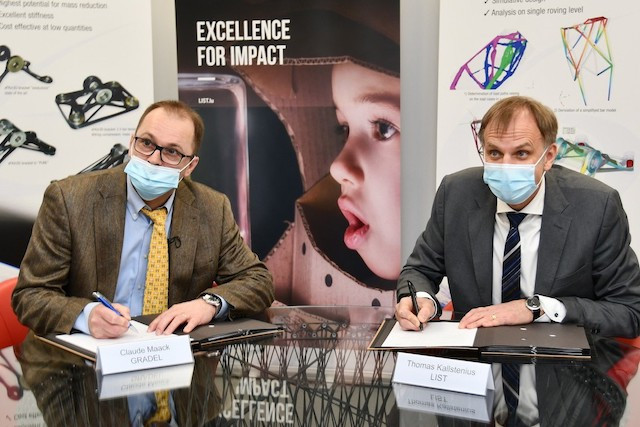Ultra-lightweight but durable materials can help aerospace companies save money, with List estimating that it costs €5,000 to €10,000 to transport one kilogramme of material into space.
Gradel, established in Luxembourg since 1965, and List will be using technology acquired from German company AMC to investigate the use of carbon fibre composite materials to create 3D structures. The project also hopes to improve on the so-called xFK in 3D technology and automatise production using a robotic arm.
“Gradel began working with ultra-lightweight structures in the space sector in 2018 by signing an exclusivity contract with AMC, which developed xFK in 3D first in the automotive sector. Now with List, we have a strong partner with deep knowledge in materials and process of composite structures allowing us further qualification for space applications,” said Gradel’s managing director Claude Maack in a statement.
The research laboratory is supported by the Luxembourg Space Agency together with the European Space Agency. It received public funding through Luximpulse, a grant programme aimed at helping companies bring innovative products to market, managed through the space agencies.
Researchers hope that they can achieve up to 75% weight reduction by producing parts from this ultra-lightweight material that are currently made of heavier metals. Three satellite makers--Thales Alenia Space (France), Airbus Defence and Space (France), and OHB (Germany)--have already signed on for parts.
The Italian subsidiary of OHB previously received a contract from the Luxembourg government to build an Earth observation satellite operated by the country’s military. Thales Alenia Space is a joint venture between arms contractors Thales and Leonardo. Both companies, together with Airbus, feature on an investment ban list by Luxembourg’s pensions fund for controversial weapons activities.
Thales Alenia Space in February 2020 signed an agreement with the economy ministry to set up a digital centre of excellence in Luxembourg, with plans to fund an industrial professorship at the University of Luxembourg.
